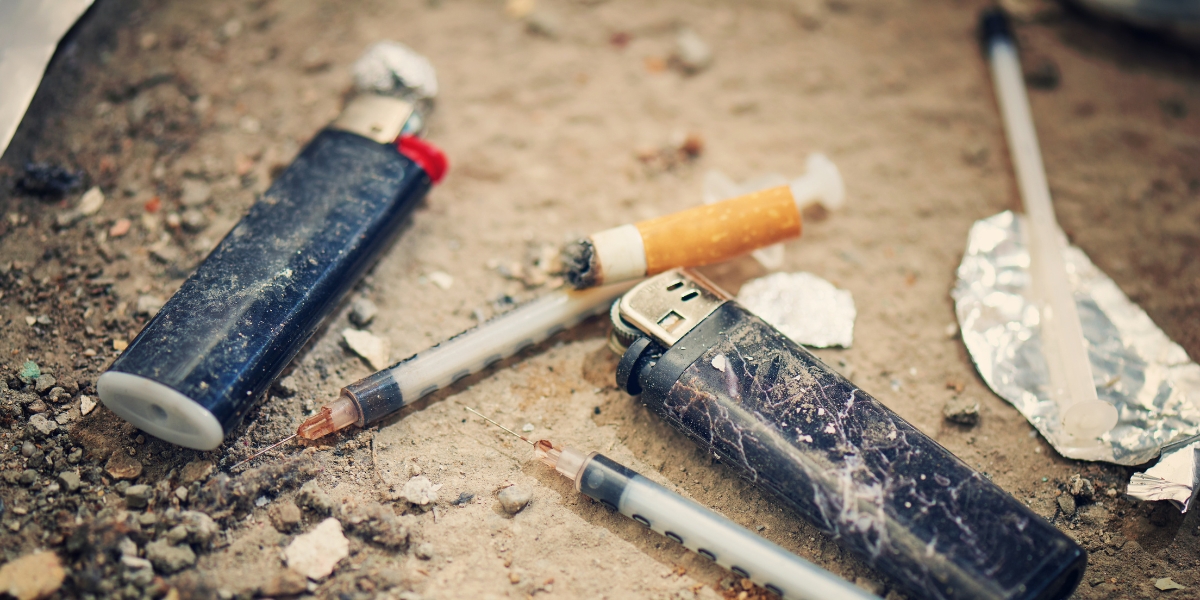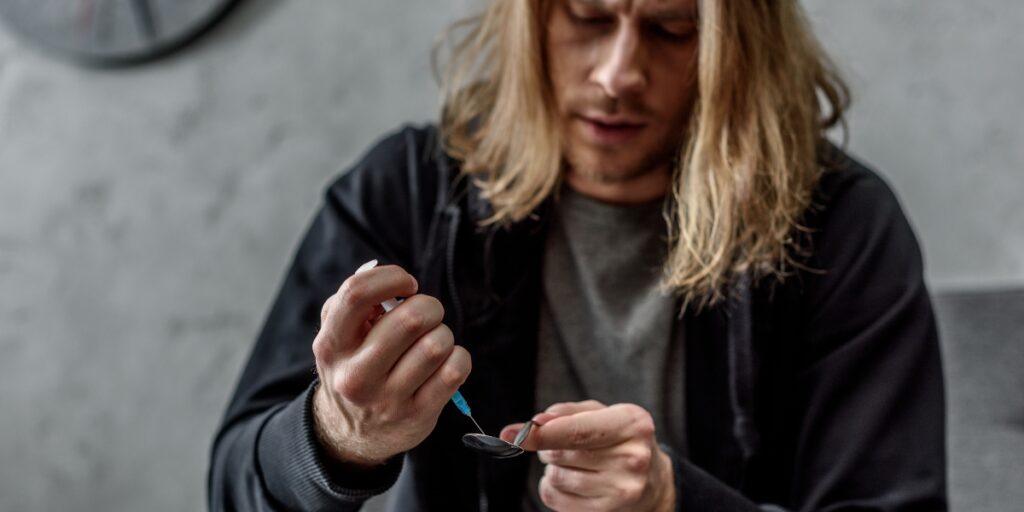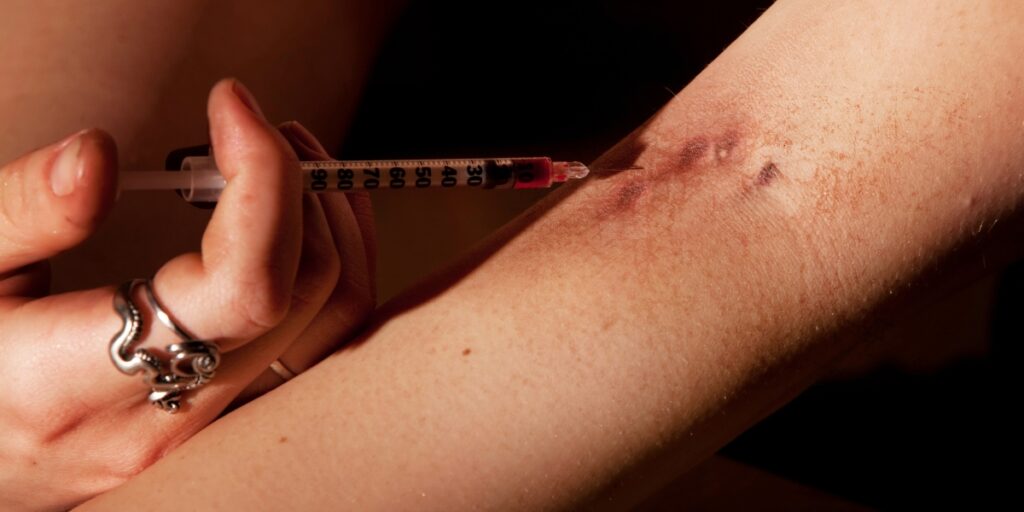Heroin Addiction

The issue of heroin addiction continues to worsen in the United States, so the availability of effective and caring addiction treatment programs is crucial for Americans.
The prevalence of prescription opioid drug use alone among Americans exceeds 2.5 million individuals, which continues to rise. Many people addicted to heroin don’t know where they can get help or only receive partial treatment that doesn’t improve their condition long-term.
Extensive research and experimentation conducted by scientists have shown the best approaches for addressing heroin addiction. The studies revealed that the most effective treatment modalities include a range of therapeutic interventions targeting addiction’s physiological, psychological, behavioral, and emotional parts.
What Is Heroin?
Heroin is an illicit substance known for its highly addictive properties that comes from the opium poppy plant. In the United States, most heroin is sourced from Southeast Asia and typically looks like a white or brown powder.
However, certain regions witness the prevalence of a distinct form of heroin known as black tar heroin, primarily sourced from Central and South America. This type of heroin is a brown or black sticky substance.
Each type of heroin undergoes processing and contamination, often involving adding substances such as baby formula or fentanyl. This serves the purpose of augmenting drug production and occasionally increasing its potency, making it more addictive. While heroin addicts usually use via intravenous injection, sometimes sharing needles, some individuals snort or smoke the drug.
Why Is Heroin So Addictive?
Heroin can lead you to addiction easily because it gives you intense pleasurable feelings that permanently change how your brain and central nervous system work.
Drug addiction, or substance use disorder, influences the brain’s reward mechanism, stress reactivity, and capacity for self-control. These changes in the brain tend to persist even after an individual discontinues the use of substances.
Upon ingestion of heroin, it binds to specific regions of the brain known as opioid receptors. This interaction leads to an amplified release of dopamine, functioning as a neurotransmitter responsible for generating the pleasurable sensations commonly linked to the high associated with its use.
Using heroin repeatedly can make the body rely on it to correct the chemical balance. This means a person becomes physically dependent on heroin and needs more frequent doses to feel the same effects. This is called tolerance.
Heroin addiction occurs when the body becomes dependent on the substance while the mind becomes accustomed to the profound sense of pleasure it brings. However, when an individual decides to cease heroin use, they often encounter a challenging phase known as withdrawal. During this period, they endure distressing and intense symptoms. The severity of these symptoms often drives many individuals who want to quit heroin back into its use to evade the tormenting withdrawal experience.

Heroin Side Effects
The effects of heroin can vary from person to person, depending on factors such as dosage, method of administration, and individual physiology. Consuming heroin for the first time makes individuals experience an initial sensation of warmth spreading throughout their entire body, accompanied by relaxation and drowsiness. However, with continued heroin use, unwelcome and undesirable side effects may manifest, leading to a deteriorating state that individuals wish to avoid.
Short-Term Effects
How long the short-term effects of using heroin last can depend on how much a person uses. Some common short-term side effects of heroin include:
- Dry mouth
- Feeling heavy in the limbs
- Itching
- Skin flushing
- Feeling nauseous
- Vomiting
- Diarrhea
- Going in and out of consciousness or nodding off
- Speaking slowly or slurring words
- Having trouble focusing or concentrating
- Slower reflexes
- Losing control of body movements
- Changes in body temperature
- Breathing becoming slower
As a person gets used to using heroin more, some of these short-term effects might go away. However, some of these side effects can also be signs of a heroin overdose, so it’s important to be ready to get emergency help.
Medical experts from the National Institute on Drug Abuse (NIDA) and advocates for harm reduction suggest that heroin users and their friends and family should have a life-saving medication called Narcan readily available. Narcan can temporarily reverse an overdose until help arrives.
Long-Term Effects
If a person doesn’t get help for their heroin addiction, the long-term effects of using heroin become more noticeable. Heroin addiction can lead to physical and mental changes in people and increase the risk of lifelong illnesses that need ongoing care.
Here are some of the long-term effects of heroin:
- Trouble sleeping
- Collapsed veins
- Weakened immune system
- Depression
- Anxiety
- Wounds that heal slowly or won’t heal at all
- Kidney infections
- Heart valves and lining infections
- Abdominal bloating and cramping
- Frequent lung infections, such as pneumonia
- Sexual dysfunction
- Having trouble getting pregnant or fertility problems
- Memory problems
- Suicidal thoughts
Most of these long-term effects can improve with time and the proper treatment. But it’s tough for people who use heroin to quit alone. They usually need to go to special programs where they stay for a period of time, known as inpatient treatment, to get help for their addiction. This helps them avoid going back to using heroin and causing the same problems.

Heroin Withdrawal Symptoms
When someone stops using heroin, they can start experiencing withdrawal symptoms as early as a few hours after their last dose. If a person quits heroin suddenly, especially after using it for a long time, they can have severe withdrawal symptoms that might need emergency help.
Here are some common heroin withdrawal symptoms:
- Restlessness
- Muscle pain
- Joint and bone pain
- Watery eyes
- Runny nose
- Cravings
- Insomnia
- Nausea
- Vomiting and diarrhea
- Stomach cramps
- Sweating excessively
- Feeling hot and cold
- Chills and goosebumps
- Dehydration
- Twitches and muscle spasms
- Depression
- Easily annoyed
- Annoyed
- Angry or violent outbursts
- Increased heart rate
- Changes in blood pressure
- Extreme fatigue
Withdrawal from heroin can be unpredictable, mainly if an individual is also addicted to other substances. It’s always safest to go through withdrawal in a professional treatment center where medical detox is available.
Heroin Detox
Heroin detox removes the drug from your body, which means going through withdrawal. As mentioned before, heroin withdrawal symptoms can be tough to handle and may discourage people from completing detox and getting treatment. One of the main advantages of residential treatment programs is having medical professionals oversee detox to manage heroin withdrawal.
Medications are provided during medical detox to help reduce withdrawal discomfort. Professionals with licenses oversee your physical health and overall well-being, assisting with the difficult emotional symptoms that arise during detoxification.
Medical detox also involves dual diagnosis, identifying and treating other co-occurring disorders. Managing symptoms during and after withdrawal is crucial in addressing substance use disorders.
Medical detox is the first step in treating heroin addiction, but following it up with evidence-based treatments and behavioral therapies is essential. Several research studies have indicated that individuals who undergo treatment at rehabilitation facilities that offer inpatient care experience the most successful outcomes in the long run.
Medication-Assisted Treatment for Heroin Addiction
Medication-assisted treatment (MAT) serves as an effective approach to addressing heroin addiction by using FDA-approved medications. This therapeutic approach aims to alleviate the discomfort of withdrawal symptoms, reduce cravings for heroin, and help prevent relapse.
Additionally, individuals with co-occurring mental health problems may receive long-term prescriptions for medications such as antidepressants to manage their specific conditions effectively.
The two medications that are FDA-approved as highly effective for treating heroin addiction include:
- Naltrexone – Naltrexone functions as an opioid antagonist by binding to the opioid receptors in the brain, effectively obstructing the attachment of heroin to these receptors.
- Buprenorphine – Buprenorphine acts as a partial opioid agonist, engaging with the opioid receptors in the brain with a reduced binding intensity compared to full agonists.
It’s important to understand that medication-assisted treatment (MAT) is not about replacing one drug with another. By incorporating non-addictive medications into treatment plans, MAT programs can successfully address addiction symptoms while also tackling addiction’s behavioral and psychological elements.
Residential treatment centers that provide medication-assisted therapy programs, such as Northridge Addiction Treatment Center, can be beneficial because they offer a smooth transition from detox to treatment. They provide an established and personalized treatment plan to support individuals on their recovery journey.

Evidence-Based Treatment for Heroin Addiction
If you or someone you care about is facing heroin addiction, there is hope for effective and compassionate treatment. Northridge Addiction Treatment Center specializes in creating personalized treatment plans that address the entire person, not just the addiction.
NATC’s private residential treatment facility provides onsite medical detox and medication-assisted treatment. Our goal is to ensure that your heroin withdrawal process is as comfortable and safe as possible with round-the-clock medical care and support.
Our caring and knowledgeable treatment specialists are ready to assist you. Contact us today.
Find Meaningful Recovery
Our caring and compassionate specialists are eager to help you comfortably navigate this journey to recovery. Our individualized treatment plan, programs, and therapies may be a perfect match for you or your loved one. Let us assist you in living the happy life you deserve. It starts with a phone call.




